Newly released hostages face 'psychological, physical' challenges: Dr. Marc Siegel
FOX News medical contributor Dr. Marc Siegel breaks down the biggest challenge ahead for newly released hostages as they begin the recovery process on 'FOX Report Weekend.'
JERUSALEM – On Sunday evening, when Israeli newscasters announced that 4-year-old Avigail Idan was among the third batch of hostages being released by Hamas from Gaza, it seemed as if the entire Jewish state breathed a collective sigh of relief.
The curly-haired toddler, an American citizen whose parents were both brutally murdered by Hamas terrorists on their kibbutz in southern Israel on Oct. 7, is only one of the hundreds of horrifying stories that have captured the public’s attention here over the past seven weeks.
Yet her release – and that of other Israeli children – as part of a ceasefire deal now playing out between Israel and the terror group that governs the Palestinian enclave can be seen as a clear symbol of the psychological warfare that continues to be waged by the terrorists against Israelis.
"This is psychological terrorism, that is the only way to describe it," Lt. Col. (res) Shaul Bartal, a senior researcher at the Begin-Sadat Center for Strategic Studies at Bar Ilan University near Tel Aviv, told Fox News Digital.
ISRAELI POLICE SAY EXTREME SEXUAL VIOLENCE, RAPE BY HAMAS TERRORISTS WAS SYSTEMATIC
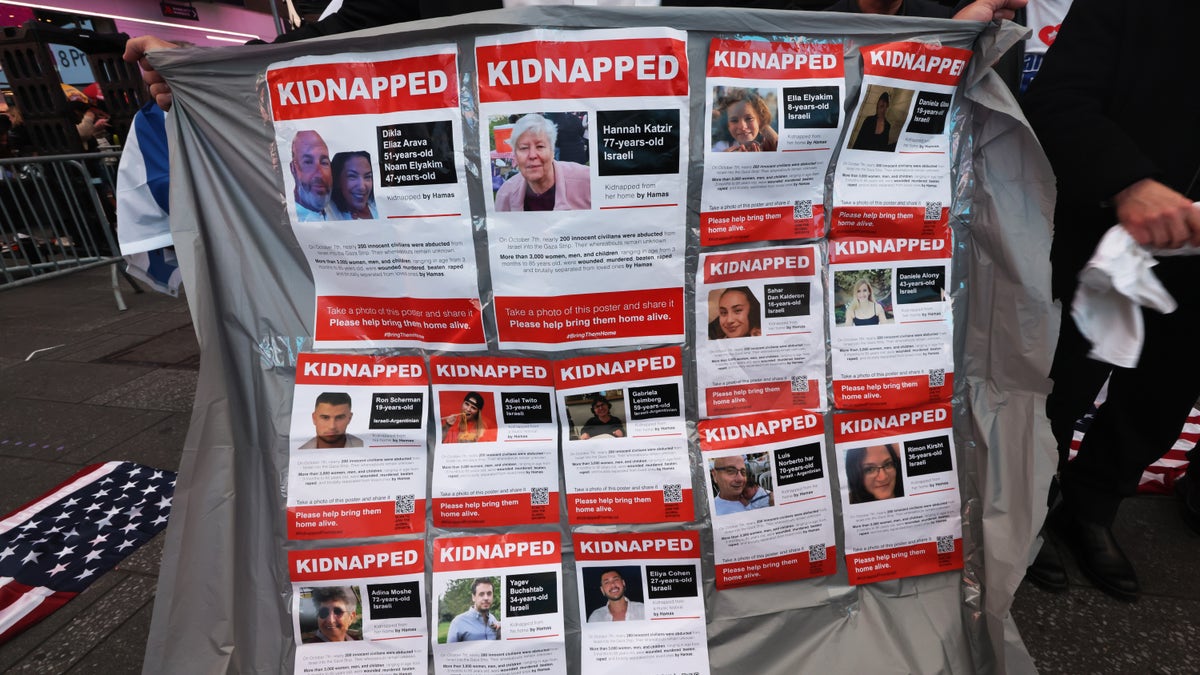
A man holds a banner displaying photos of kidnapped Israelis at a rally in Times Square demanding Hamas free Israeli hostages on Oct. 19, 2023 in New York City. (Photo by Michael M. Santiago/Getty Images)
For the past three days, since the truce went into effect early Friday morning with the promise that some 40 children, their mothers and maybe even grandmothers, would be released by Hamas after nearly 50 days in captivity, a real-life psychological thriller – akin, some have said to the fictional survival process themed in Suzanne Collins’ popular trilogy The Hunger Games – has been playing out.
Under the U.S.-Qatari-Egyptian-brokered cease-fire, every day, Hamas hands Israel a list of around a dozen names of civilians it kidnapped during its terror attack, and in return, Israel gives them a list of some 30 Palestinian prisoners, mostly women and minors convicted of terror offenses it will release and, in addition, allows truckloads of aid, including much-needed fuel, to enter Gaza.
It is a process seemingly designed to inflict – at least on the Israeli side – the maximum amount of anxiety and terror. Each day, as the Israeli media, government authorities and hostage's relatives countdown to the scheduled release time, Hamas, apparently aware that its hostage-taking extends far beyond some 200 people it still holds, seems to invent a myriad of caveats and hurdles that exacerbate the event, making it far more traumatic and stressful.
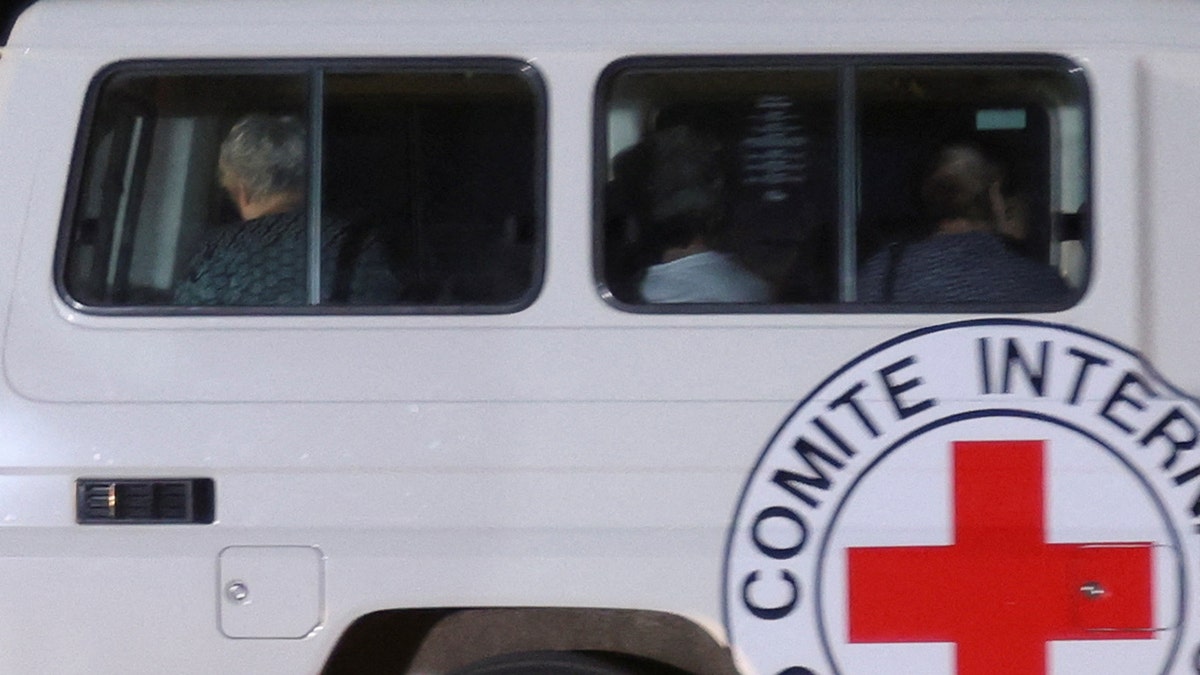
A Red Cross vehicle, part of a convoy believed to be carrying hostages abducted by Hamas terrorists during the Oct. 7 attack on Israel, arrives at the Rafah border, amid a hostages-prisoners swap deal between Hamas and Israel, as seen from southern Gaza Strip Nov. 24, 2023. (REUTERS/Ibraheem Abu Mustafa)
For example, the first group of hostages released on Friday evening, which saw 13 Israelis – mostly elderly women – and an additional 11 Thai nationals (agricultural laborers who had been working in Israel), was Hannah Katzir.
On Nov. 9, the 77-year-old Katzir was featured in a disturbing hostage video, with Palestinian Islamic Jihad, another terror group that operates in Gaza, saying they wanted to free her because of humanitarian concerns. A week later, instead of releasing her, however, the group announced she was dead.
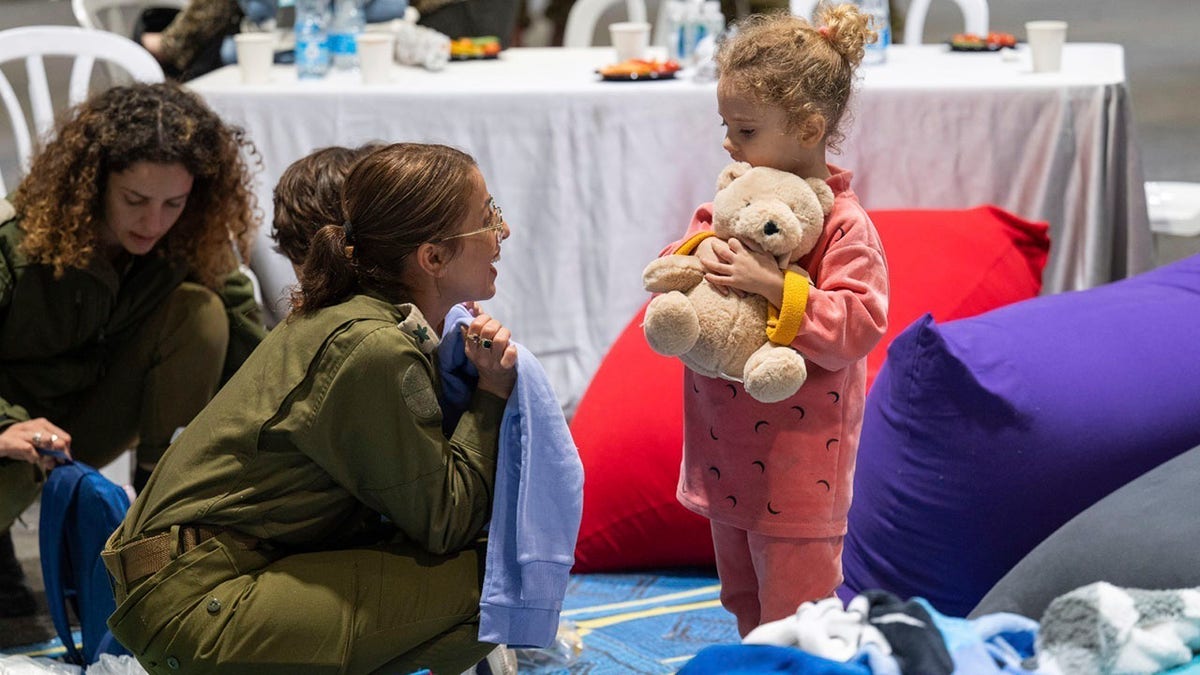
This handout photo provided by the Israel Prime Minister Office shows Yahel Shoham, 3 years old, upon her arrival in Israel after being freed. Yahel was one of the 13 Israeli hostages that Hamas released late Saturday, Nov. 25, in the second round of swaps under a cease-fire deal. (Israel Prime Minister Office/Handout via AP)
Then there is also the story of 13-year-old Hila Rotem. Kidnapped along with her mother, Raya, on Oct. 7, when the schoolgirl arrived back in Israel on Saturday she was alone, despite Hamas agreeing – under the terms of the cease-fire deal – not to separate families. Hamas, according to media reports, told mediators that they had lost track of Raya. Meanwhile, Hila said the two had been together until Friday, when they were forcibly separated.
There are many other cases of Hamas separating children from their parents or grandparents and wives from their husbands. In one instance, a young woman, Maya Regev, 21, was taken with her younger brother, Itai, 18, was also sent home alone.
Bartal explained that psychological terrorism is "using psychological ways to play with the minds of your victims."
"Hamas knows that Israel is really sensitive to human life, they know that Israel is really sensitive to children, to women, and to innocent people being killed," he said, highlighting a Jewish concept called "pidyon shvuyim," an ancient religious duty to do everything possible to release a fellow Jew captured by slave dealers or robbers, or imprisoned unjustly.
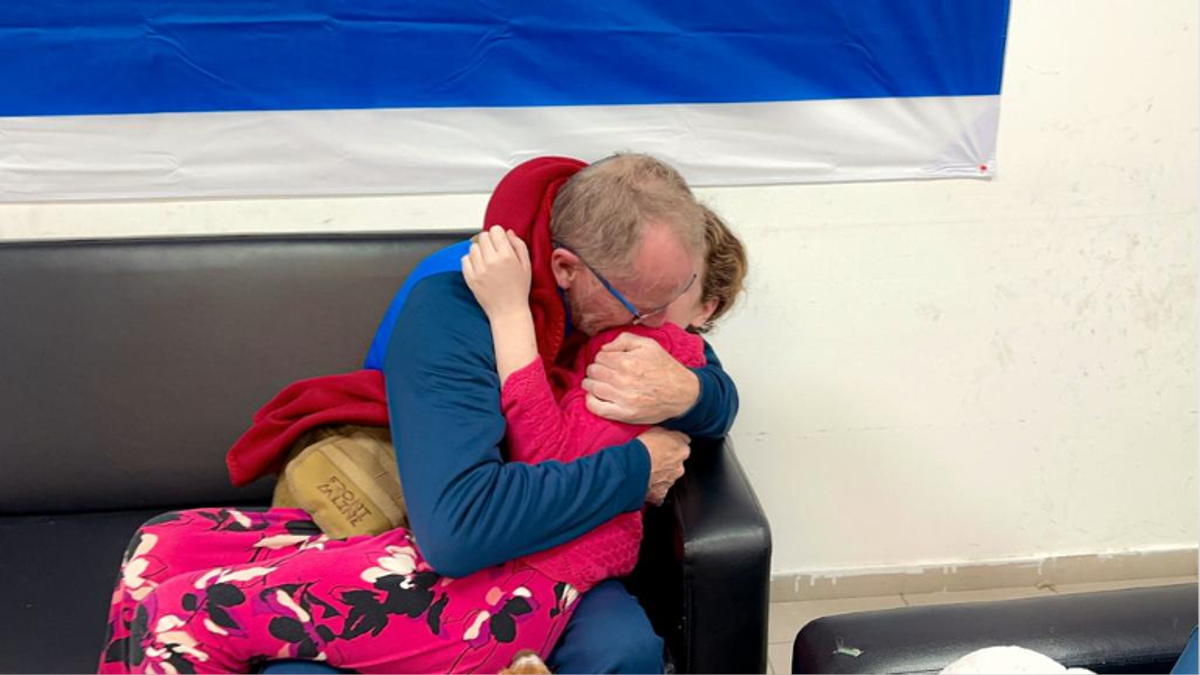
The IDF released a photo of Emily Hand, 9, and her father meeting again after Emily was kidnapped and spent 50 days as a hostage with Hamas terrorists. (IDF Spokesperson's Unit)
Bartal said kidnapping Jews was common practice in medieval Europe and is now clearly being used by the Islamists of Hamas.
"Hundreds of years ago, this was how European antisemitism played out," he said. "Now we are seeing it being used by Islamic antisemites."
The slow drip of hostages is exactly how Hamas wants this traumatic scenario to play out, said Bartal, adding, "They want to see it continue, they do not want Israel to call an end to this or to say ‘will not continue playing this game.’"
"Right now, Israelis know there is a baby being held without its mother, a brother who is there without his sister or any other person who is captive with no other relatives and Hamas knows Israel will continue this process because they know those people are alive," he said.
The plight of the hostages – so far, some 40 have been released, with nearly 200 people still remaining in captivity – has taken a central role in Israeli consciousness during this war. The families of those being held have been extremely vocal over the past seven weeks, staging art installations and even a march from Tel Aviv to Jerusalem, to pressure the government to return their loved ones.
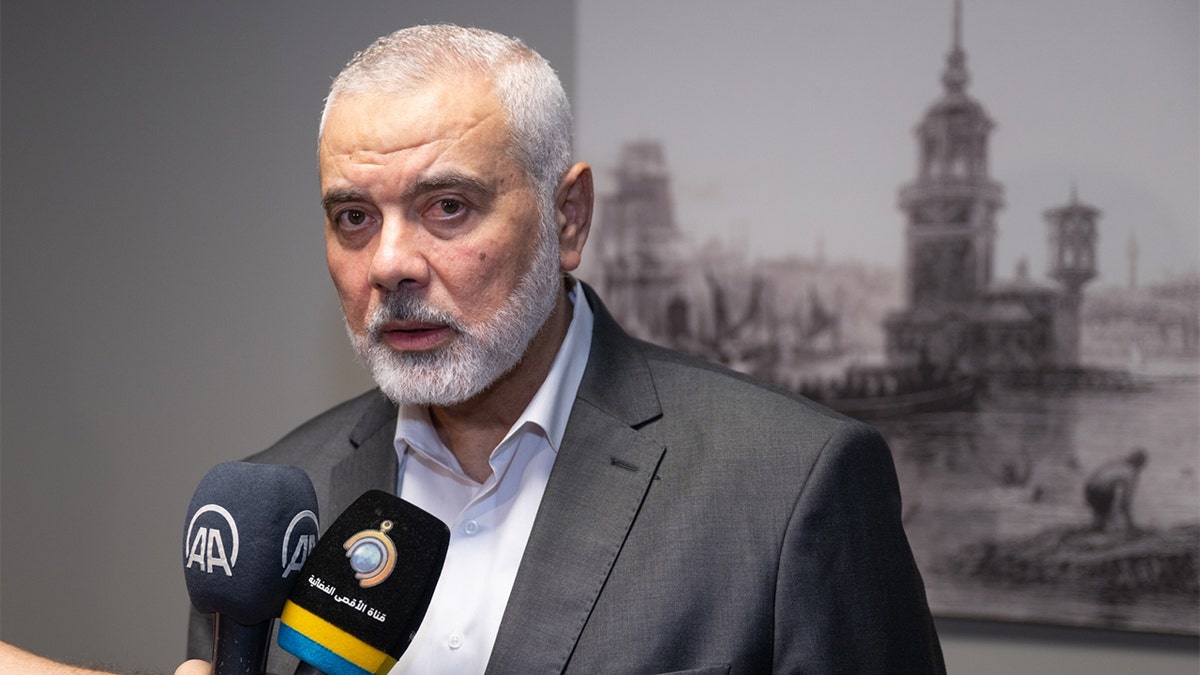
Senior Hamas leader Ismail Haniyeh speaks to the press on Sept. 22, 2023. (Cem Tekkesinoglu/Anadolu Agency via Getty Images)
Strategically, Hamas has taken advantage of this sensitive issue, releasing haunting hostage videos that the local media has refused to air, as well as videos showing them "kindly" escorting those they have held in underground tunnels for weeks to the waiting vehicles of the International Red Cross.
Every detail, even down to the route the Red Cross vehicles take from Gaza to Israel, appears to be orchestrated to send a cynical message to Israelis, some analysts here say. During Friday’s release, the convoy carrying 13 Israelis and 11 Thai nationals was forced to travel through southern Gaza, where it was pelted by rocks, those who were released said.
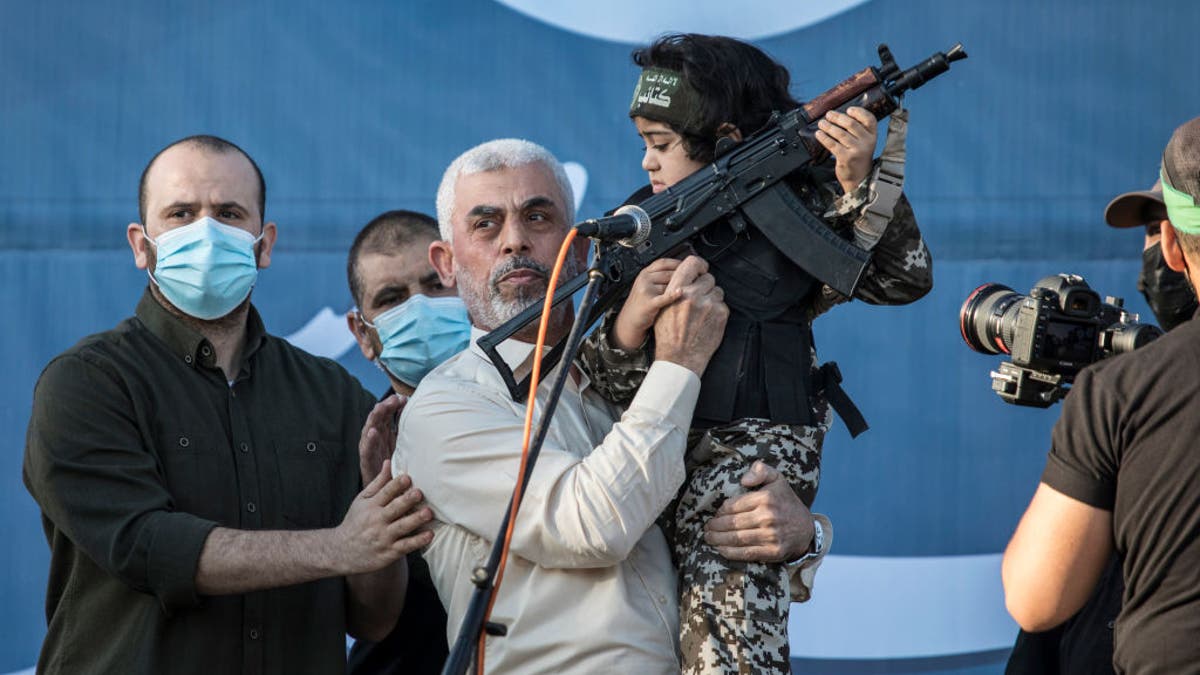
Yahya Sinwar, middle, the elected leader of Hamas, appears during a ceremony for fighters killed by Israeli air strikes at Yarmouk football Stadium on May 24, 2021 in Gaza City, Gaza. (Photo by Laurent Van der Stockt/Getty Images)
Saturday’s release was held up for hours when Hamas claimed that aid Israel said it would deliver to northern Gaza had not arrived, even though the International Red Crescent, which has been distributing food, water and medicine in Gaza, released photographs and statements saying that it had. Hamas also said that Israel had reneged on their deal by releasing low-level Palestinian prisoners from its jails, even though they had received the list of prisoners set for release hours before.
For Sunday’s release, Israel managed to negotiate a route for the freed hostages and their Red Cross escorts through northern Gaza, which is a shorter journey and less perilous because it is now under Israeli control, even though three more Thai nationals who were also released, and one Israeli went through the southern part of the enclave.
"Hamas has planned for all of this, including the delay on Saturday – that was the most prominent expression of psychological warfare," Michael Milshtein, head of the Palestinian Studies Forum at the Dayan Center at Tel Aviv University told Fox.
"They said it was the result of a misunderstanding, that they did not understand the full list of prisoners being released, but they knew exactly what it was," he said. "People were shocked and astonished, but that is what they wanted to achieve."
Milshtein said that the videos of balaclava-covered Hamas terrorists escorting Israeli hostages to Red Cross cars were also a cynical attempt to convince the Arab world that they are "positive and fair players."
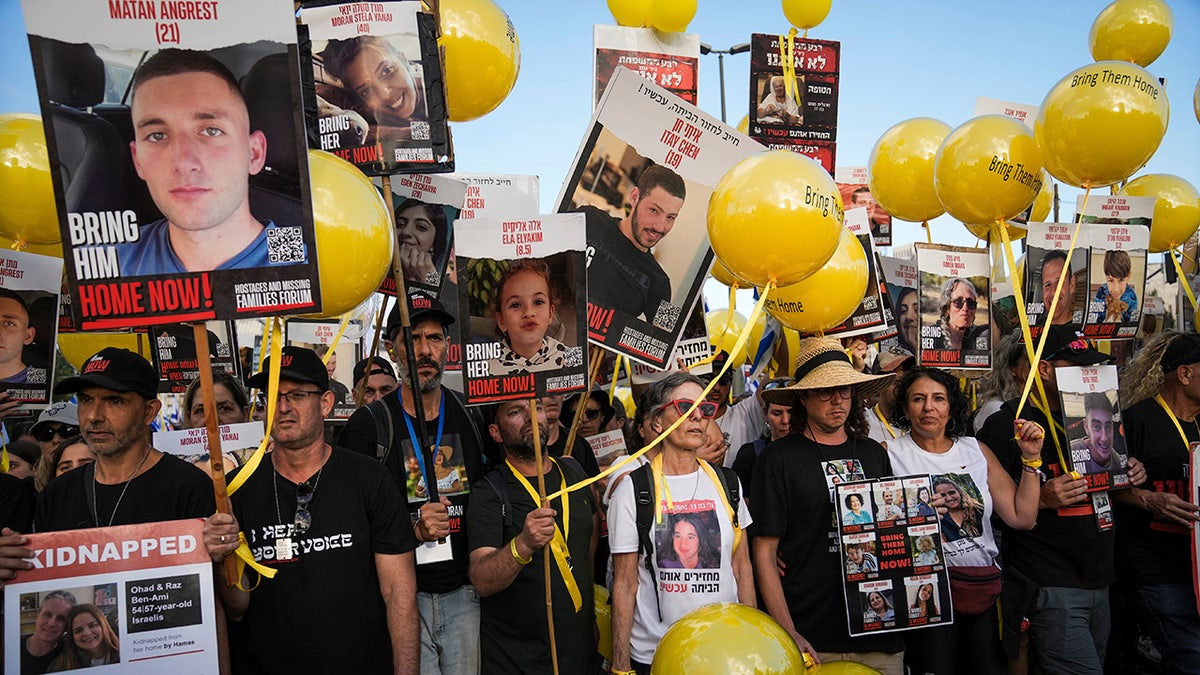
Family and supporters of the estimated 240 hostages held by Hamas in Gaza complete the final leg of a five-day solidarity rally calling for their return from Tel Aviv to the Prime Minister's office in Jerusalem, Saturday, Nov. 18, 2023. The hostages, mostly Israeli citizens, were abducted during the brutal Oct. 7 Hamas cross-border attack in Israel and have been held in the enclave since as war rages. (AP Photo/Mahmoud Illean)
CLICK HERE TO GET THE FOX NEWS APP
"It is ridiculous that terrorists, with weapons over their shoulders who shot some of the hostages, are trying to portray themselves as the good guys," he said.
The Arabic media seemed to buy the act, said Milshtein. "They said ‘Hamas is really behaving like gentlemen,’ but it’s all part of this psychological war they are playing."





















